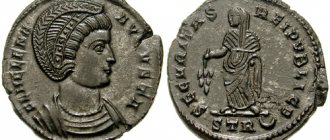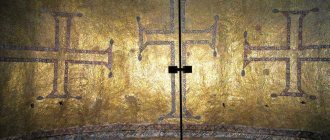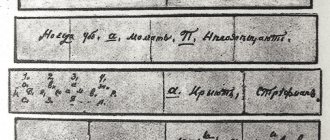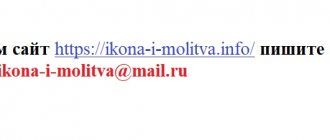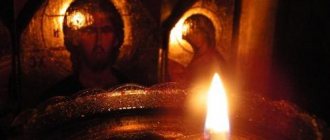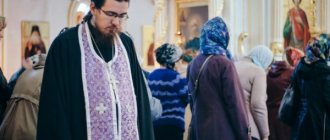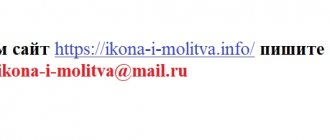Circumstances of the edict
The original decree has not survived to us; it is not found in the Codex Theodosianus of 438. It is preserved only in the decree (litterae) of Licinius, given to the Nicomedia president on June 13, 313, and in Eusebius in a series of documents translated from Latin into Greek, located in the middle of the 10th book of his Ecclesiastical History as "a copy of the imperial decrees translated from the Roman language", as a decree written on behalf of Constantine and Licinius. But in the narrative about the events that took place after the victory over Maxentius, even in the stories about the emperors’ stay in Milan, there is no mention of the edict. Thus, Eusebius, narrating what happened immediately after the victory, writes: “After this, Constantine himself, and with him Licinius, considering God the author of all the blessings bestowed upon them, both unanimously and unanimously promulgated the most perfect and thorough law in favor of Christians ( νομον υπερ χριστιανον τελειωτατον πληρεστατον) and both the description of the miracles performed by God over them and the victory won over the tyrant, and the law itself, were sent to Maximinus (τον νομον αυτόν Μαξιμινω), who still ruled the eastern peoples and showed feigned friendship to his co-rulers. Maximin, as a tyrant, upon learning of this, was very upset, however, in order not to seem as if he was inferior to others and at the same time fearing to conceal the command (το κελευσθεν) of the emperors, of necessity, as if on his own behalf, wrote to the regional commanders subordinate to himself the following first charter in favor of Christians"; The following is the order of Maximinus to Sabinus (Eusebius. Ecclesiastical History IX, 9). Apparently, we are talking about the Edict of Milan, but the place of publication is not indicated, the time is not precisely determined (cf. επι τουτοις) and the very text of the “most perfect law” is not given, and by inference it is easy to come to the conclusion that the law mentioned here appeared back in 312. In fact, in 313, shortly before his death, Maximin promulgated another law in favor of Christians, where he called the rescript he issued in the name of Sabinus “last year,” i.e. appeared in 312 (το παρελθοντι ενιαυτω ενομοθετησομεν)… These are the ambiguities of Eusebius.
Lactantius talks about the stay of the rulers in Mediolanus. “Constantine, having finished his affairs in the city of Rome, withdrew during the coming winter to Mediolanus, where Licinius also came to receive a wife,” i.e. Constantine's sister Constantia (De mortibus persecutorum XLV, 9). The publication of the edict here is not mentioned in a single word by Lactantius. Given this rather sad state of historical data about the Edict of Milan, it is not surprising if, for example, the researcher of the Constantine era Seek denies its authenticity. According to Seeck, the document called the “Edict of Milan” is not an edict at all, was not issued in Milan or by Constantine, and does not establish the legal tolerance that Christians have long enjoyed. Seek is referring to the decree of Galerius of 311 and, along with it, the “so-called Edict of Milan” considers it completely unnecessary. The so-called Edict of Milan is only a letter from Licinius addressed to the President of Bithynia to abolish the restrictions that Maximinus Daia had hampered the actions of the Edict of Galerius in 311, and the document of Eusebius is a translation of the same letter from Licinius, sent to Palestine where Eusebius lived. However, it is impossible to agree with Zeek. Both sources - Eusebius and Lactantius - clearly speak of the stay of the two Augusti in Milan and the decree regarding religions that took place. One cannot be satisfied with the assumption that only an oral agreement took place in Milan and, accordingly, a rescript was issued by Licinius for the eastern provinces, while Christians lived freely in the western ones. Such a serious law as that on religious freedom could not help but be recorded in writing, especially since in the lists of Eusebius there are the words: “This will of ours should have been stated in writing,” in the legislative act of the rescript. Then, in the rescript to the president, Licinius does not at all present this legislative act as his own work; and such an act could not have been personally issued by Licinius, who remained a pagan at heart. On the other hand, Eusebius’s list cannot be considered as a translation from the same Licinian rescript, only sent to Palestine. Eusebius's list has an introduction that Licinius does not have. Where could Eusebius borrow it from? There are features in the text itself that make it hardly possible to consider Eusebius’ list as a translation of the Licinian Rescript. Namely, in Eusebius we read: “This will of ours was to be stated in writing, after the removal of all the restrictions that were contained in the decree sent by your honor earlier in our decree regarding Christians (Lactantius has no further words), and which seemed very unkind and inconsistent with our meekness, for this to be arranged." To explain his disposition towards Christians in such expressions and to recall in this way, probably, the edict of 311 could have been the only characteristic of Constantine. Licinius in this place could only understand the oppression of Maximin, and he speaks about them. To explain the deviation of Eusebius’ list from Lactantius’s, it seems necessary to assume that Eusebius had the original Edict of Milan at hand and translated from it, or someone else did it for him. And the very state of affairs is in favor of such an assumption. We said that in book 9 of Church History Eusebius mentions the law, but does not expound it. However, he thought to set out this and other laws at the end of Book IX, just as he ends Book VIII with the edict of 311. In the original (actually the second) edition, at the very end of Book IX, it was about legislation in favor of Christians, through which Constantine and Licinius proved their love for God. According to Eduard Schwartz, the edition of Eusebius' Church History ending with Book IX (the first edition was in 312-313 and ended with Book VIII) appeared in 315 and consisted of a well-known collection of documents subsequently placed by Eusebius in the middle of Book X. Here, the first place belonged to the Edict of Milan, which took place at the beginning of 313. As for the conclusions from Maximin’s rescript that the Edict of Milan was issued in 312, then Maximin, as co-ruler, in all likelihood, was sent a draft in 312 edict and when he refused to sign it, Constantine and Licinius issued it in their own name only.
Story
Remains of the Imperial Palace Mediolanum (Milan).
The Imperial Palace (built in large part by Maximian, a colleague of Diocletian) was a large complex with several buildings, gardens and courtyards that were used for the emperor's private and public activities, as well as for his court, family and imperial bureaucracy. With the fall of the Severan Dynasty in 235 AD. Rivals for the imperial throne tried to gain support by favoring or persecuting Christians.[4] The previous Edict of Toleration of Galerius had recently been issued by the Emperor Galerius of Serdicum and was posted on Nicomedia on April 30, 311. In accordance with its provisions, Christians who "followed such caprice and fell into such madness that they disobeyed the institutions of antiquity" were granted lenience.[5]
Therefore, for the sake of our leniency, they must pray to their God for our safety, for the safety of the republic and for their own, so that the state does not suffer from everywhere and so that they can live safely in their homes.
However, their confiscated property was not restored until 313, when instructions were given for the return of Christian meeting places and other property and for the state to pay compensation to the current owners:[6]
the same will be returned to the Christians without payment or any claim for refund and without any fraud or deception.
He ordered the provincial magistrates to immediately carry out this order with all energy, so that public order could be restored and divine favor preserved, in order to “preserve and increase our successes together with the good of the state.”
The actual letters were never received. However, they are quoted at length in Lactantius' On the Death of the Persecutors
(
De mortibus perissionum
), which contains the Latin text of both Galerius's Edict of Toleration, sent to Nicomedia on 30 April 311, and Licinius's letter of toleration and restitution, addressed to the governor of Bithynia and sent to Nicomedia on 13 June 313.[7]
Eusebius of Caesarea translated both documents into Greek in his History of the Church
(
Historia Ecclesiastica
).
His version of Licinius's letter must come from a copy placed in the province of Palaestina Prima (probably his capital, Caesarea) in the late summer or early autumn of 313, but the origins of his copy of Galerius's edict of 311 are unknown, as he appears to have was not made public at Caesarea. In his account of the events in Milan in his Life of Constantine
, Eusebius excluded the role of Licinius, whom he portrayed as an evil foil to his hero Constantine.[
citation needed
]
The decree was actually directed against Maximinus Daia, Caesar in the East, who at the time called himself Augustus. Instructed by Emperor Galerius to call off the persecution in 311, Maximin ordered his subordinates to desist, but did not release Christians from prison or actual death sentences in the mines, as Constantine and Licinius had done in the West.[8]
After Galerius' death, Maximinus was no longer restrained; he enthusiastically supported the resumption of persecution in the eastern territories under his control, encouraging petitions against Christians. One of these petitions, addressed not only to Maximinus but also to Constantine and Licinius, is preserved in a stone inscription at Aricanda in Lycia and represents "a request to the Christians, who have long been disloyal and still persist in the same malicious intent, should finally , to be suppressed and not tolerated by any absurd novelty that offends the honor of the gods."[8]
It is generally accepted that the Edict concerns only Christianity and even makes Christianity the official religion of the Empire (recognition of this fact did not occur until the Edict of Thessaloniki in 380). Indeed, the Decree expressly grants freedom of religion not only to Christians who have been subjected to special persecution, but goes even further and grants freedom to all religions:
When you see that we have granted this [to Christians], your Worship will know that we have also given other religions the right to openly and freely observe their worship for the sake of the peace of our time, that each of them may have free opportunity to worship as it pleases ; This decree is made so that we do not feel that we are belittling the dignity of any religion.
— “Edict of Milan”, Lactantius, On the Death of the Persecutors (De Mortibus Perissionum)
, ch.
48. Opera, ed. 0. F. Fritzsche, II, p. 288 sq. ( Bibl Patr. Ecc. Lat.
XI).[9]
Since Licinius wrote the Edict with the intention of publishing it in the east [ citation needed
] after his long-awaited victory over Maximin, he expresses the religious policy adopted by Licinius, a pagan, rather than Constantine[
citation needed
], who was already a Christian.
Constantine's policies went beyond mere tolerance of Christianity: he tolerated paganism and other religions, but actively promoted Christianity.[ citation needed
]
Text of the Edict of Milan
The text of the Edict of Milan reads as follows: “Even earlier, believing that freedom in religion should not be restricted, that, on the contrary, it is necessary to grant the right to take care of Divine objects to the mind and will of everyone, according to his own free will, we also commanded Christians to observe the faith according to their chosen religion. But since in the decree that granted them such a right, many different conditions were actually set, then perhaps some of them soon later encountered obstacles to such observance. When we arrived safely in Mediolan, I, Constantine-Augustus and Licinius-Augustus, discussed everything that related to public benefit and well-being, among other things that seemed useful to us for many people, in particular we recognized the need to make a resolution aimed to maintain fear and reverence for the Divine, namely, to grant Christians and everyone the freedom to follow the religion that everyone wishes, so that the Deity in heaven (Greek, so that the Deity, whatever it may be, and whatever is in heaven) may be merciful and is favorable to us and to everyone under our authority. So, we have decided, guided by sound and correct reasoning, to make such a decision so as not to deprive anyone of the freedom to follow and adhere to the faith observed by Christians, and that everyone is given the freedom to follow the religion that he considers best for himself, so that the Supreme Deity, revered by us out of free conviction, could show ordinary mercy and favor towards us in everything.
Therefore, it behooves your honor to know that we wanted that, after the removal of all the restrictions that could be seen in the decree given to you earlier regarding Christians (Greek, “this will of ours should be stated in writing, so that after the elimination of all the restrictions that were contained in the decree sent to your honor earlier regarding Christians and who seemed very unkind and inconsistent with our meekness") - so that this would be eliminated, and now everyone who wants to support the religion of Christians could do this freely and unhindered, without any embarrassment or difficulty for themselves. We considered it necessary to announce this with all the thoroughness of your trusteeship, so that you know that we have also granted Christians the rights of free and unlimited content of their religion. Seeing that we have allowed this to them, your honor will understand that others have also been granted, for the sake of the peace of our times, similar complete freedom in observing their religion, so that everyone has the right to freely choose and worship what he pleases; We have decreed this so that it does not seem that we have caused any damage to any cult or religion (the Latin text is corrupted).
In addition, regarding Christians, we decree (Latin - decided to decree) that those places in which they previously usually had meetings, about which in the previous decree a well-known (Greek - other) decree was made to your honor, if they turn out to be bought in the previous time by some persons, either from the treasury, or from someone else - these persons would immediately and without hesitation return to the Christians without money and without demanding any payment; Likewise, those who received these places as a gift should give (them) to Christians as quickly as possible. At the same time, both those who bought these places and those who received them as a gift, if they seek anything from our favor (Latin - let them ask for an appropriate reward, - Greek - let them turn to the local eparch), so that they too our mercy was not left without satisfaction. All this must be transferred, with your assistance, to the Christian community immediately, without any delay. And since it is known that Christians owned not only the places where they usually gathered, but also others that were the property not of individuals, but of their societies (Latin - that is, churches; Greek - that is, Christians ) all this, by virtue of the law that we defined above, you will order to be given to Christians, i.e. society and their meetings, without any hesitation or contradiction, in compliance with the above rule, so that those who return them free of charge hope to receive a reward from our kindness.
In all this, you are obliged to provide the above-mentioned community of Christians with all possible assistance, so that our command is carried out as soon as possible, so that this expresses our mercy’s concern for public peace and then, in view of this, as noted above, the Divine will come to us the goodwill that we have already experienced to such a great extent will always remain, contributing to our successes and general well-being. And so that this merciful law of ours can become known to everyone, you must display what is written here everywhere in your public announcement and bring it to general knowledge, so that this law of our mercy does not remain unknown to anyone.”
The Edict of Milan and Christian Freedom
In 2013, the entire Christian world solemnly celebrates the 1700th anniversary of the publication of the Edict of Milan. I have just returned from the Serbian city of Nis, where the holy Equal-to-the-Apostles Emperor Constantine was born. There were inter-Orthodox celebrations dedicated to the anniversary of the document, which became fateful for the history of Christianity. His Holiness Patriarch Kirill took part in the celebrations along with the heads of other Local Orthodox Churches, including the Patriarchs of Constantinople, Jerusalem and Serbia.
For the Russian Orthodox Church, the year of the 1700th anniversary of the Edict of Milan coincided with another significant anniversary - the 1025th anniversary of the Baptism of Rus'. This coincidence allows us to reflect on the historical path of the Church, to reflect on the ancient event that marked the beginning of a new Christian civilization, but at the same time to appreciate our own recent history. What we have experienced and what we continue to live with today can be confidently called the “second baptism of Rus'.” In my opinion, our era - the era of the revival of the Church - has something deeply similar to the era that followed the promulgation of the Edict of Milan. The connection between times is the concept of freedom. It is on the topic of Christian freedom that I would like to reflect today.
The Edict of Milan is, in fact, the first official state document in the Roman Empire, thanks to which the “Catholic Church” receives not only the right to exist, but also state and public recognition. If before this Christians were persecuted and exterminated, if they could only exist in the catacombs and deep underground, then thanks to the Edict of Milan, Christians for the first time, on an equal basis with pagans, received the right to openly profess and preach their faith, build churches, open monasteries and schools. A huge achievement of the Constantinian era was the recognition of the Church as a full-fledged participant in social processes, which allowed it not only to freely organize its internal life, but also to have a significant influence on the life of the state and society.
Many Christians of that time still remembered how the persecutors squeezed the Church out of public space and drove it into the ghetto. Many were confessors with destinies broken by violence and oppression. For many Christians of the early 4th century, the eloquent, but at the same time painful appeals of the apologists of the 2nd-3rd centuries to the state leaders of the Roman Empire remained the truth of their own lives.
We touch upon the worldview of Christians during the era of persecution by reading, for example, Tertullian's Apology. He exclaims: We have existed since yesterday, and have filled with ourselves all your places: cities, islands, fortresses, municipalities, meeting places, the very camps, tribes, decuries, palace, senate, forum. We left only your temples to you. For what open war we would not be capable, for what war we would not be ready, even if we were inferior to you in strength - we, who so willingly allow ourselves to be killed, if our teaching did not command us to be killed ourselves rather than kill others? We could fight you without weapons and without rebellion, separating from you as dissatisfied with you. For if we, being such a huge number of people, were to retire from you to some distant corner of the earth; then, of course, the loss of so many, whatever, citizens would not only be a disgrace for your rule, but at the same time a punishment (Tertullian. Apology, 37).
Christians in the era of persecution had to prove to the imperial authorities their loyalty and their suitability for full participation in the life of civil society. But the authorities remained deaf to this evidence. And suddenly the same generation of persecuted and oppressed Christians becomes witnesses to the recognition of the Church as an integral part of society. Moreover, within a few years after the publication of the Edict of Milan, Christianity transformed into a spiritual force that largely determined the course of the further history of the empire and the whole world.
As a result of the Milan Agreements, Emperors Constantine and Licinius asserted something completely new, unheard of for their contemporaries. They publicly declare: So, guided by common sense and right, we announce our following decision: no one is prohibited from freely choosing and observing the Christian faith, and everyone is given freedom to turn his mind to that faith which, in his opinion, suits him, so that the Divine may send in all cases, we receive immediate help and every good thing... From now on, everyone who has freely and simply chosen the Christian faith can observe it without any hindrance... [Christians] are given unlimited freedom... freedom is also given to others, if they wish, to observe their faith, which corresponds to our time of peace: let everyone freely, at their own discretion, choose their faith (quoted from: Eusebius. Church history 10, 5).
It is important to note that this document did not give freedom to Christianity to the detriment of other religions of the Roman Empire; followers of various pagan cults retained their rights and freedoms as before. However, the Edict of Milan essentially recognized the fact that the Church was not some marginal sect corrupting traditional social foundations. On the contrary, the authors of the document are convinced that Christians are capable of extending God’s mercy to all people. The godliness and usefulness of Christians for society is what the new edict relied on, expressing the hope that the “Divinity” will send down to the authorities and people of the empire “in all cases, first aid and every good thing.” These lines not only equalized Christians in rights and freedoms with pagans, but opened up the opportunity for them to declare themselves as a new force capable of positively influencing society and filling its existence with divine meaning.
Thanks to the Edict of Milan, Christians were faced with the need to think not only about their salvation and the good of their small community. The new situation in society forced them to think about the quality of this society, about their role in it - the role of active citizens, prayer workers for the fatherland, people of good will.
In the new conditions, Christians - bishops, theologians, monks and many laity - were not at a loss. A rapid flowering of Christian thought and culture began in the empire, Christian historiosophy was born, and a new attitude of the Church to the world around it was formed. The era, which began with the publication of the edict, went down in history as the golden age of Christianity, and for the empire this era became a time of changing ideological paradigms. The theology of the Church formed the basis for a new understanding of personal, social and state responsibility, influenced the renewal of all institutions of society, gave a new value foundation to family relationships, attitudes towards women, and led to the gradual elimination of the institution of slavery in the empire. The new empire combined the Roman culture of legal relations, the Greek art of graceful thought and the piety of Jerusalem. And Christianity became a new religion in him, the foundation of a new worldview capable of uniting all the diversity of races and peoples of the empire. Having received a historical chance, the Church took full advantage of it.
The principle of freedom of conscience, proclaimed in the Edict of Milan, formed the basis of the new attitude of the authorities towards their subjects. Over sixteen centuries, the Edict of Milan anticipated something that only fully became possible in the twentieth century, after centuries of war and discrimination. In a number of international documents that form the basis of modern world law (such as, for example, the International Bill of Human Rights, the European Convention for the Protection of Human Rights and Fundamental Freedoms), the freedom to profess one’s faith and live in accordance with it is the main the idea of the edict is postulated as one of the most important freedoms of the human person.
Something similar to what happened in the Roman Empire in 313 happened 25 years ago on the scale of the then Soviet Union. We witnessed how the Church in our country, after many trials and bloody sacrifices, suddenly emerged from the ghetto, rose from its knees and began its victorious march through cities and villages. A significant part of society regained its Christian identity. The Constitution of the Russian Federation and the Constitutions of other independent states that emerged in the post-Soviet space clearly expressed state recognition of freedom of religion. Of course, this freedom was declared earlier, but in fact only after 1988 did it take on real shape, and Christians again received a historical chance in the vast expanses of Russia, Ukraine, Belarus, Moldova, Georgia, Armenia, Central Asia, and the Baltic countries.
It all started with the fact that in the mid-1980s, the issue of freedom of conscience arose at the center of public discussion in the USSR. The Church played an active role in this discussion. Once again, like sixteen centuries ago, by the very fact of its existence, contrary to the surrounding reality, the Church exposed the crisis of freedom, and at the same time it exposed the internal fragility of the previous order of things. In the collapsing system of values there was no longer any political, economic, or semantic bond capable of uniting the people.
And so, quite unexpectedly, in the context of the celebration of the 1000th anniversary of the Baptism of Rus', originally conceived as a purely church celebration, what is commonly called genetic memory, national or religious identity, awakened in the popular consciousness. Thousands and millions of people throughout the Soviet Union openly expressed their position by taking part in the celebrations, filling churches and squares during anniversary services. The authorities had no choice but to see and admit that the Church is not a museum exhibit or an animal in a cage, but the spiritual power of a people of many millions, capable of reviving and renewing it. Those events marked the beginning of the revival of the Church, which, not coincidentally, coincided with fundamental changes in the state and social system of our country.
Some events in the history of the Church cannot be explained except by a miracle of God. Such a miracle was the era that followed the Edict of Milan in 313. No less a miracle happened in our country in the late 1980s. Could people who just a few years earlier risked their well-being, and in some cases even their lives, for the sake of their faith, regard the freedom that suddenly fell on their heads as anything other than a miracle and a gift from God? Could they have expected that the godless ideology would collapse and be replaced by a different worldview, in which the Good News of the Church would again be seen as one of the foundations of society and the key to its success in the future? The countless believers who gathered for the celebrations in July 1988 could have repeated the words once spoken by Eusebius of Caesarea on the occasion of the general church celebrations that marked a new era: All the fear in which the tormentors formerly kept us has disappeared. Now the joyful and solemn days of crowded festivities have come: everything is filled with light (Eusebius of Caesarea. Church History, book 10).
In both cases, it was the granting of religious freedom that preceded the granting of other civil liberties, considered in our time as one of the main achievements of a democratic society. And this is not accidental, because it is in the Christian value system that the concept of freedom receives special content. We Christians are convinced that the gift of life is the gift of God, and that human life itself is not subject to anyone except the Creator of the human race. This conviction makes Christians free from the oppression of any political force and any ideology. It makes them capable of being martyrs and confessors when the Church is persecuted; witnesses of the truth and evangelists of the Kingdom of God, when the Church is recognized. No other religion or ideology has such a reverent attitude towards freedom. N. Berdyaev owns the following words: Freedom, first of all freedom - this is the soul of Christian philosophy and this is what is not given to any other, abstract and rationalistic philosophy (Berdyaev. Philosophy of Freedom. Part 1).
Christian freedom does not separate us from our families, from social ties, from our fatherland. On the contrary, in the very Christian understanding of freedom, in the recognition of the absolute and life-giving connection of man with God, there is enormous moral potential. Being the creation of a good God, sons and daughters of the Creator, we are called to cultivate the garden given to us, thereby bringing the Kingdom of God closer to the human race. It was this moral potential, rooted within the free human personality, that Emperor Constantine saw in Christianity, allowing this powerful positive creative charge to be released and influence the entire society.
This same potential for Christian freedom has been released in our people after decades of ideological oppression. I am convinced that our people overcame the colossal social and economic catastrophe of the 1990s and found the strength to rise from their knees precisely because Christian blood still flows in them and in the depths of our national consciousness the idea of Christian freedom has not yet been erased.
Recently, more and more often we can observe how in Western countries, and some in our country, a different freedom is proclaimed: from moral principles, from universal human values, from responsibility for one’s actions. We see how destructive and aggressive this freedom is. Instead of respecting the feelings of other people, she preaches permissiveness, ignoring the beliefs and values of the majority. Instead of a genuine affirmation of freedom, it affirms the principle of uncontrollable satisfaction of human passions and vices, which is far from elementary moral guidelines.
The aggressive attitude of such a falsely understood freedom brings it closer to the totalitarianism of the era of persecution and the godlessness of the twentieth century. “Totalitarian freedom,” based on human passions, takes us back to the times of the pagans, albeit in a more crafty and sophisticated form. Before our eyes, scenes familiar to us from the events of the godless decades of our country are unfolding again. Militant atheism, often in the most monstrous and grotesque forms, again raised its head and boldly declared itself in the vastness of Europe. Moral relativism and permissiveness are elevated to the basic principle of existence. And now we see buses driving around London with the inscriptions “There is no God, enjoy life” or “You are gay, be proud of it.” We hear about how in Paris, batons and tear gas are used to disperse a demonstration of supporters of traditional family values who do not want same-sex couples to adopt children. We are witnessing how blasphemers appear on the pulpit of the main temple of Moscow, their actions arousing the approval of a certain part of society.
In this context, the historical lesson of the Edict of Milan becomes extremely valuable. He shows that a new round of development of civilization must be based on the freedom that rests on solid moral foundations. It is from such freedom that all other types of freedoms should grow, and from it also grows a state alien to totalitarianism. Otherwise, freedom again becomes only a declared abstract value, and liberal ideology enslaves and zombies a person, just as godless ideology did in the recent past.
In the 4th century, for the first time in its history, the Church began to integrate into civil society; Christians for the first time felt the opportunity to realize their faith and their beliefs for the benefit of their earthly fatherland. The power of Christian theology - the theology of atonement and resurrection, the theology of the Kingdom of God coming in power - was to be revealed in the lives of many peoples inhabiting the then ecumen.
Nowadays, the Church and its Sacred Tradition (Tradition) have become a revelation for our people. An entire generation of people cut off from the Church found faith again. The situation in which we find ourselves - the situation of finding a forgotten Tradition, the churching of society, the revival of the Church - has set us a task: to understand what the Christian Tradition with a capital C is and who we are in this Tradition. In addition, acquaintance with the history of Christian civilization, with the history of the Church, opened up for us an understanding of the role of the Church in completely different eras - prosperity and oppression, mistakes and trials. The Church did not know this in the era of Constantine, when it was just taking its first steps as a recognized social institution.
We can say today that the Church over the past seventeen centuries has become more mature, more sophisticated. The historical experience of the Church does not allow us, having received freedom, not to use it wisely. Today, special wisdom is required from the hierarchy of the Church, because we have received such a historical chance that we have no right to miss. His Holiness Patriarch Kirill accepted this mission, making one of the priorities of his ministry the building of relations between the Church and the state, institutions of civil society and with every citizen capable of hearing the word of the Church. On the day of his accession to the patriarchal throne, he spoke of a unique historical opportunity for Russia to realize the ancient Christian idea of a “symphony” of church-state relations. According to the Patriarch, one of the main ideas of the ever-memorable Patriarch Alexy that “the Church is separated from the state, but not separated from society,” should in our time receive its logical continuation and development.
While not yet a Patriarch, the then chairman of the Department for External Church Relations of the Moscow Patriarchate, Metropolitan Kirill, spoke about freedom and responsibility as two absolute values, without interaction between which it is impossible to build a just society. Today, such thoughts are increasingly heard from the lips of statesmen. Today, the Church and the state in Russia, as well as in some other countries of the post-Soviet space, are able to speak with a single voice and express a single position.
I recently had to take part in a meeting of the Valdai Club, a discussion group created 10 years ago by Russian President Vladimir Putin. At this meeting, the President spoke about what our Church has been talking about over the past years - about the conscious rejection of European countries from their Christian identity: “We see how many Euro-Atlantic countries have actually taken the path of abandoning their roots, including Christian values that form the basis of Western civilization. Moral principles and any traditional identity are denied: national, cultural, religious or even gender. A policy is being pursued that puts large families and same-sex partnerships, faith in God or faith in Satan on the same level... And they are trying to aggressively impose this model on everyone, the whole world. I am convinced that this is a direct path to degradation and primitivization, a deep demographic and moral crisis.”
Continuing his thought, the Russian President emphasizes: “Without the values embedded in Christianity and other world religions, without the norms of morality and ethics that have been formed over thousands of years, people will inevitably lose human dignity. And we consider it natural and correct to defend these values. The right of any minority to be different must be respected, but the right of the majority must not be questioned.”
What path does Putin propose for Russia? What values does he consider key for the development of our society? “You need to be strong militarily, technologically, economically, but still the main thing that will determine success is the quality of people, the intellectual, spiritual, moral quality of society. After all, in the end, economic growth, well-being, and geopolitical influence are derived from the state of society itself, from how citizens of a particular country feel like a single people, how rooted they are in their history, in values and in traditions, whether they share common goals and responsibilities. In this sense, the issue of acquiring and strengthening national identity is truly of a fundamental nature for Russia.”
It is no coincidence that I dwelled in such detail on Putin’s Valdai speech. It seemed iconic to me. It testifies that the position of the Russian Orthodox Church and other traditional confessions of our country was not just heard, not just taken into account. It seems that we have finally reached the time when the voice of government leaders can be heard in unison with the voice of people of faith. Is this not eloquent evidence that the “symphony” that the Patriarch spoke about on the day of his enthronement is taking on real shape?
Consonance between the Church and the state in assessing social processes cannot in any way be considered a sign of a “merger” between them. The principle of mutual non-interference between the Church and the state in each other’s internal affairs must be and is being preserved. But this principle must be balanced by another, no less important principle: cooperation between the Church and the state in all those areas in which this cooperation is possible and necessary. And it turns out to be necessary in a variety of areas related to the sphere of public morality.
Today, both the state and representatives of religious denominations, as well as non-religious people who unexpectedly find themselves in the minority, can take full part in the discussion about the value guidelines of social development. We must create a society in which no one will be uncomfortable, in which everyone can realize their God-given freedom. But at the same time, freedom should not turn into permissiveness. Each member of society should feel responsible not only for himself, but also for his fatherland, for the entire world around him.
Today we cannot view society as a soulless mechanism governed by legal norms. Society is also a spiritual organism that is governed by spiritual laws. It is not for nothing that we talk about a moral and immoral society, about a sick society and a healthy society. The state’s ability to influence the spiritual sphere of human life is very limited, while the Church has enormous opportunities here. In order for the interests of society to be fully realized, it is necessary that civil freedom, which the state can and should ensure, be coupled with religious freedom. Because it is freedom that is the connecting link between two spheres of public life: civil and spiritual.
This topic is complex and multifaceted; it provokes discussions and requires discussions. Throughout Christian history, ever since the historical edict was signed in Milan, which granted the Church freedom, the Church has been in continuous dialectical development: on the one hand, it must preserve its freedom, bought at the price of blood, on the other hand, it is called implement it.
Any freedom is valuable when it is associated with responsibility and sacrifice. To have freedom means for the Church to remain the “salt of the earth,” the leaven of the Gospel, the spiritual strength and conscience of the people. Realizing your freedom means acting, using the opportunities that the Lord gives for service and preaching. This is how the world works that freedom is a condition for decisive but deliberate action. Freedom is a means, a condition for creativity. And creativity is involvement in the life of society with all its internal contradictions.
We are destined to live in a time when in our hands, in the hands of Christians, is the precious gift of freedom - the same gift that Christians received in the era of Emperor Constantine the Great. This gift of Divine Providence opens up enormous opportunities for us. However, the gift of freedom also places enormous responsibility on us. The ability to use the gift of freedom requires special wisdom from the older generation of people of the Church, and colossal dedication from young workers in God’s field.
Speaking about the idea of Christian freedom as a thread that connects the era of Constantine with our era, I turn my thoughts to the feat of the apostles and martyrs, apologists and holy fathers of the 4th and subsequent centuries, right up to the new martyrs and confessors of the Russian Church. From the very moment of its inception, through all generations, thanks to the feat of heroes of the spirit, the Church guarded its freedom like the apple of its eye. And no matter what researchers say about church-state relations in Byzantium and Rus', at its very core the Church remained free, regardless of the external political situation. The freedom to confess Christ as Lord and to live according to His commandments will remain a constant for the life of the Church and for the life of every Christian until the moment when “the heavens pass away with a noise, and the elements burn with fire and are destroyed, the earth and all the works on it are burned up” (2 Pet. 3). :10).
I would like to wish all of you, and in your person the entire future generation of the Church, to preserve the spirit of that Christian freedom, which considers as vanity everything that does not bow its head before the living God and before the Savior of the world Jesus Christ. While maintaining this inner freedom, do not be afraid of creativity, do not be afraid of the risk of creativity. For the Lord calls us to be His co-workers in this world, and co-working cannot but be creativity in the highest sense of the word.
And one more wish that I would like to address to all of us today: while bringing the word of Christ to the world, let us not forget that the best testimony has always been and will be the example of our own lives. Let our creativity begin in our souls, in our families, parishes and monastic communities, in theological schools, in dioceses and metropolises. Then the power of our testimony will reach the entirety of society and each of its members. Then we will be able to thank God with our lives lived worthily for the precious gift of freedom that He gives to us, Christians, and which no one has the right to take away from us.
Speech at the annual event of the St. Petersburg Theological Academy on October 9, 2013 mospat.ru
The meaning of the Edict of Milan
To understand the meaning of the Edict of Milan, you need to compare it with the Edict of 311. The Nicomedia Law wants to ensure the life of Christians: “Let there be Christians again and build places of assembly.” This tolerant edict tolerates Christians as a necessary evil. Granting them life, he demands: “that they do nothing against public order,” and promises: “by other decrees we will notify the judges that they are obliged to observe.” What the publisher of the edict is so afraid of on the part of Christians is almost certainly the propaganda of Christianity, which was forbidden to Judaism under penalty of death. It is this cause of Christianity “against public order” that Galerius wants to suppress “with other decrees.” In all likelihood, he failed to issue new decrees; but it is quite possible that they nevertheless saw the light, perhaps thanks to the executive will of Augustus Licinius, for the Edict of Milan at the very beginning indicates, as a reason for its appearance, the elimination of restrictions that were restrictive for Christians in the previous decree. What does the Edict of Milan give? It is very conveniently divided into two parts: the first deals with freedom of religious confession, the second deals with the property and social rights of Christians, i.e. as corporations, and private or personal rights. In the first respect, the words are characteristic: “everyone has the right to freely choose and honor what he pleases; We have decreed this so that it does not seem that we have caused any damage to any cult or religion.” From this it is clear that the Edict of Milan establishes the so-called parity, the equality of all religions and the free right of every citizen to follow any religion without hindrance. Professor Lebedev’s opinion that by this edict “Christianity was declared to be at the head of all religions, proclaimed the only religion ...” does not correspond to the text of the Edict of Milan, nor to the circumstances of its origin. Professor Brilliantov rightly emphasizes that the edict comes not only from Constantine, but also from Licinius; Maximin was probably also involved in signing it. But how could one think that Licinius, and even more so Maximinus, could sign an edict proclaiming the dominance of the Christian religion?
Religious statement
Although the Edict of Milan is usually presented as Constantine's first great act as a Christian emperor, it is debatable whether the Edict of Milan was an act of genuine faith. This document can be seen as Constantine's first step in creating an alliance with the Christian God, whom he considered the most powerful deity.[10] At the time, he was concerned with social stability and protecting the empire from the wrath of the Christian God: from this perspective, the Decree may have been a pragmatic political decision rather than a religious shift. However, most historians believe that Constantine's conversion to Christianity was genuine and that the Edict of Milan was merely Constantine's first official act as a dedicated Christian. This view is supported by Constantine's constant favors on behalf of Christianity throughout the rest of his reign.[11]
The Edict of Milan required that the wrongs done to Christians be corrected as thoroughly as possible; he states that "we are pleased to remove all conditions."[12] The edict further required individual Romans to correct any injustices against Christians, stating that "the same shall be returned to the Christians without payment or any claim for redress and without any fraud or deception." These provisions indicate that more than just the administration of justice was intended. After demanding the immediate return of what was lost by Christians, the decree states that this must be done to "ensure public order" and not for the true value of justice or the glory of God.[12] The call for urgent correction reflects the leaders' desire to avoid adverse consequences, which in this case included social unrest and further conquest. Constantine was superstitious and believed enough in the existence of non-Christian gods to not want to upset the balance of good and evil.[13] It was believed that the sooner this balance was restored by the Romans, who established a state of justice with Christians, the sooner the state would become stable.[ citation needed
]
Recommendations
- ^ a b c d
Friend, W. H. S.
The Early Church
SPCC 1965, p. 137 - ^ a b
Cross and Livingston.
Oxford Dictionary of the Christian Church
1974 art. "Milan, Edict". - Stevenson, J. New Eusebius
SPCC 1965, p. 302 - Friend, WHC Early Church
SPCC 1965, p. 135 - Stevenson, J. New Eusebius
SPCC 1965, p. 296 - Eusebius, Ecclesiastical History
5.15–17 - Lactantium, De mortibus perissionum
34.1–35.1, 48.1–12 - ^ a b
Inscription printed by Stevenson, J.
New Eusebius
SPCC 1965, p. 297 - And similarly in Eusebius.
- Sordi, Marta. Christians and the Roman Empire.
Norman: University of Oklahoma Press, 1994. p134. - Mayer, Paul L. Eusebius: A History of the Church
. Grand Rapids: Kegel Publications, 1999. p. 374. - ^ a b
"Paul Halsall, "Galerius and Constantine: Edicts of Toleration 311/313", Fordham University; Fordham.edu; Internet, accessed October 13, 2014. - Yuri Kosharych. "Constantinian Christianity". The-orb.net
. Internet guide to the Middle Ages. Archived from the original on February 15, 2015. Retrieved October 14, 2014.
